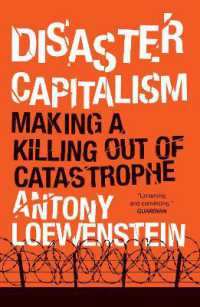- ホーム
- > 洋書
- > 英文書
- > Business / Economics
Full Description
The economic and social development that Bangladesh has achieved in the past two decades has made Bangladesh a development paradox. This book tries to explain this paradox through a political economy lens. The book explains the linkages between the state, changing society and emerging private sector, and examines whether the social transformation taking place in Bangladesh has the potential to live up to the expectations of a middle- income country.
The early part of the book unravels the myriad relations between the state, society and market to project the aspirations of a newly independent nation. It analyzes how political turmoil, militarization of politics, politicization of institutions, reforms initiatives, industrial and social development policies, and the power nexus influenced the nature of the political economy of Bangladesh. The book goes on to examine how domestic appetite for capital and raw materials, the digital revolution, and the capacity of the local market to absorb expanded economic activities have created an environment that catalyzes innovation and entrepreneurship. The book also explains how the country has attempted to transform from an agrarian to a manufacturing- based economy, with rapid growth in the ready- made garment industry, pisciculture, pharmaceuticals and the ICT sector.
Bangladesh's journey from an emerging economy towards a developed country would interest those researching on development economics and those in policy making.
Contents
Introduction 1. State and Class: The Paradox of Development and Underdevelopment 2. Bangladesh Paradox: The Political Logic of Economic Development 3. The Development State: The Bangladesh Experience 4. Civil Society Organizations in Post-colonial Bangladesh: A Coalition with Business, Civil-military Bureaucracy and Partisan Politics 5. A historical analysis of the formation of the Bangladesh public administration as an institutionally complex system 6. Institutions and Economic Development in Bangladesh: Case Study of the Political Economy of Banks and Financial Institutions (BFIs) 7. Infrastructure and Development Aspirations of Bangladesh 8. Industrial Development Policies and Performances in the Post Independent Period 9. Urban Informal Credit Markets in Bangladesh 10. Banking Sector in Bangladesh after Financial Liberalization: Promises and Realities 11. The Global Energy Crisis and South Asia - Challenges for the Future 12. The social class relationship and agrarian transformation in Bangladesh 13. Urbanisation, Governance, and Informality 14. Digitalization of Public Service Delivery: Impacts on Economic and Social Development in Bangladesh 15. Transformation of Rural Bangladesh: Land, Labor, Credit and Agriculture 16. Sustainability and Climate Change: The Bangladesh Scenario 17. Opportunities and Impediments of Women Entrepreneurship in Bangladesh 18. SDGs in the Era of the Pandemic: Impacts, Implications, and Improvement Insights from Bangladesh 19. Impact of Migrant Workers' Remittances on Rural Bangladesh: A Migrant Smiling Curve Perspective 20. The Way Forward







